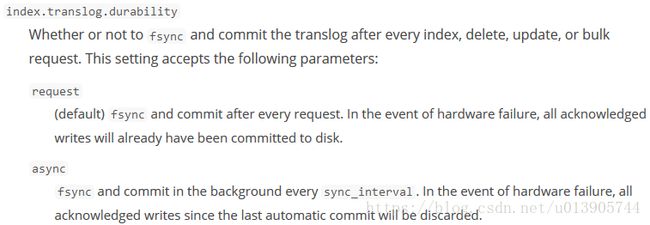将logstash与elasticsearch性能匹配的几点尝试
背景
公司的测试环境4核8G内存,安装部署ELK技术栈
elastic search6.2.4 分配4G内存空间
kibana 6.2.4
logstash 6.2.4
并集成了xpack
发生性能不匹配问题
结果在对一个表(数据大约80000条)进行全表建索引的时候:(全表建索引的逻辑是logstash使用logstash-jdbc-input从mysql表中根据jdbc_page_size来更新相应大小行数)
logstash经常会报错:
retrying failedaction with response code:429
以及
Attempted tosend a bulk request to elasticsearch' but Elasticsearch appears to beunreachable or down! {:error_message=>"Elasticsearch Unreachable:[http://elastic:[email protected]:9200/][Manticore::SocketTimeout] Read timedout",:class=>"LogStash::Outputs::ElasticSearch::HttpClient::Pool::HostUnreachableError",:will_retry_in_seconds=>2}
elasticsearch也会报错:
failed to execute pipeline for a bulk request
org.elasticsearch.common.util.concurrent.EsRejectedExecutionException:rejected execution oforg.elasticsearch.ingest.PipelineExecutionService$2@e32de6d onEsThreadPoolExecutor[name = WPhvS8c/bulk, queue capacity = 200,org.elasticsearch.common.util.concurrent.EsThreadPoolExecutor@2abeedc3[Running,pool size = 4, active threads = 4, queued tasks = 200, completed tasks = 2524]]
原因就是:logstash推送的速度太快,而elastic search消费不过来。
前提是:第一次建全表索引的时候elastic search压力会比较大,之后大多数情况下都是增量更新。
先看到一个解决方案:
sysctl -wvm.max_map_count=262144
参考:
https://www.elastic.co/guide/en/elasticsearch/reference/5.0/vm-max-map-count.html
但似乎并没啥用,原因可能不在这里
思路1:加大elasticsearch的index rate
由于是刚刚接触es,原理性的东西还不清楚,参考网上的经验在尝试
参考:
如何提高ElasticSearch 索引速度1. 调整队列长度,threadpool.index.queue_size,这个感觉治标不治本,仅仅能当queue中堆积的时候帮忙不报错,但并不能加快index rate
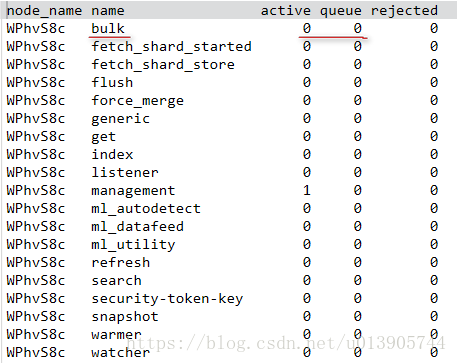
2. 修改bulk线程
如果4核,那就只能设置<=5,其实可更改的空间也不大
这两项在elasticsearch.yml中设置
thread_pool:
bulk:
size: 9
queue_size: 1000
3. 设置为translog异步落地index.translog.durability=async,
增大indices.memory.index_buffer_size
增大index.translog.flush_threshold_ops
增大index.translog.sync_interval
官方参考:
https://www.elastic.co/guide/en/elasticsearch/reference/current/index-modules-translog.html这个没有进行尝试。因为全表更新可以慢,毕竟不会经常做。
思路2:减少logstashemitted rate
如果es处理不过来,那能不能减少logstash推送的速度呢?
首先将logstash-jdbc-input中的jdbc_page_size=1
这样应该是最小了
之后配置logstash.yml
参考:
https://www.elastic.co/guide/en/logstash/current/logstash-settings-file.html将pipeline.workers=1
pipeline.batch.size=1
pipeline.batch.delay=5000
似乎这样起到了效果,每次查询语句执行的时间间隔似乎变宽了。
思路3:直接提升硬件
升级为8核16G
使用top命令查看

以及kibana监控
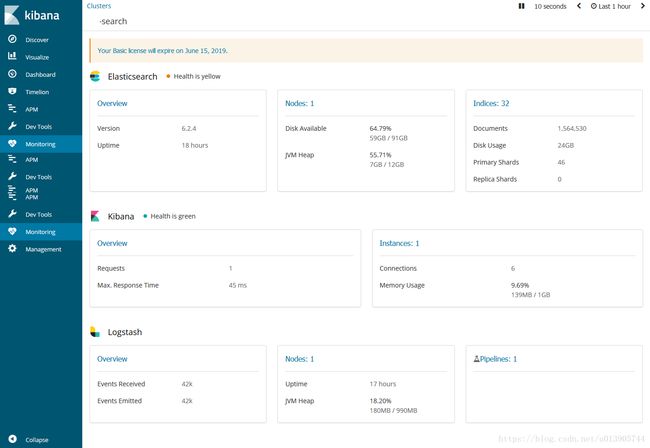
查看elasticsearch的JVM Heap
发现如果像之前部署elasticsearch JVM Heap为4G,可能存在不够用的情况
总结:
最后的效果是这样的
logstash中
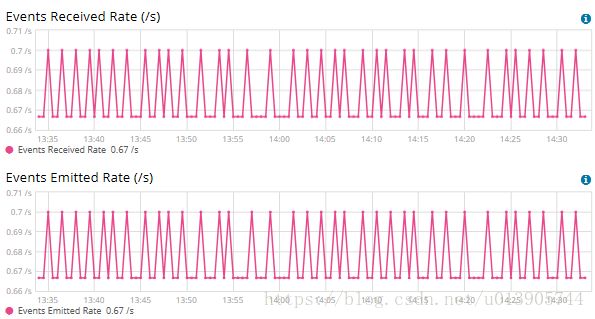
0.67/s到0.7/s之间
ES的index rate
10.67/s
整体的效果
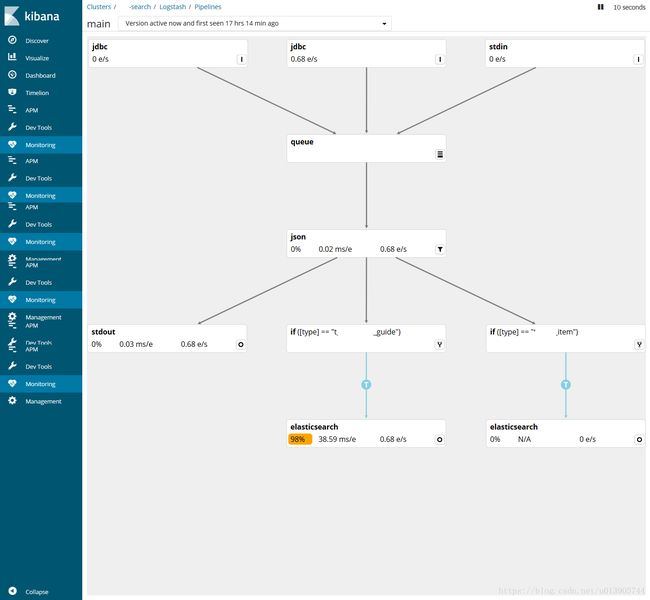
但这样将logstash的推送速度降到很低,会导致很慢。基本上更新1000条要20min左右。80000条不敢想
能不能快一点呢?考虑到ES index rate差不多是logstash emit rate的10倍
当将jdbc_page_size设置为10时,logstash event rate为0,这是为啥呢?原来显示的是每秒多少event?而我们执行的节奏是1.661529s

而我们进入到logstashpipeline中时,能够看到

而ES的index rate为
总之这样运行差不多3个小时,就全表更新了。
以上就是logstash与elasticsearch性能匹配过程中我的尝试,应该有很多错误的地方,请各位不吝赐教了
附kibana monitor监控页面内容介绍
整体介绍
https://www.elastic.co/guide/en/kibana/6.3/monitoring-data.htmlES
https://www.elastic.co/guide/en/kibana/6.3/elasticsearch-metrics.html
Kibana
https://www.elastic.co/guide/en/kibana/6.3/kibana-page.htmlLogstash
https://www.elastic.co/guide/en/kibana/6.3/logstash-page.htmllogstash pipeline
https://www.elastic.co/guide/en/logstash/6.3/logstash-pipeline-viewer.html